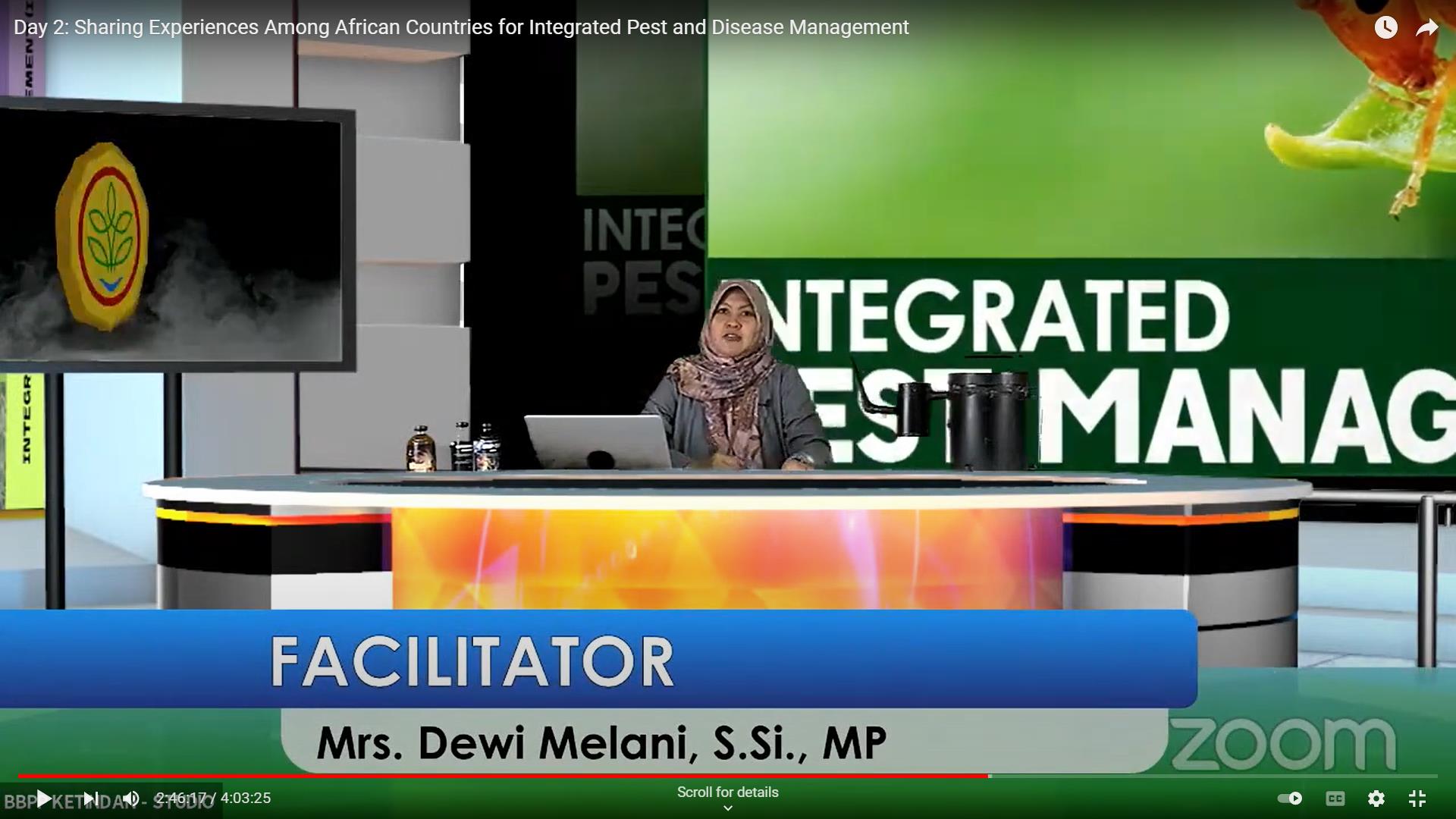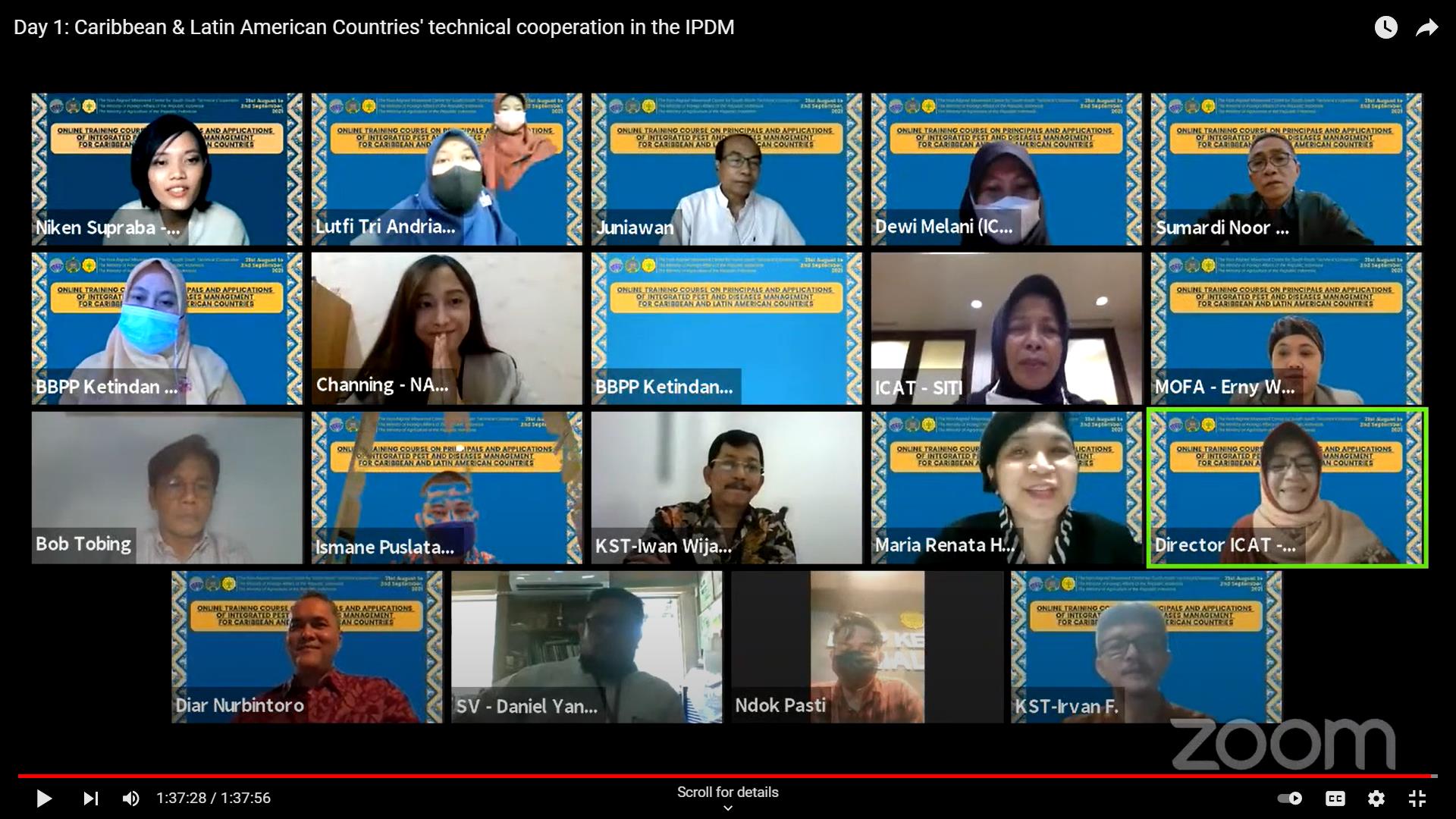 Online Training on Principles and Applications of Integrated Pest and Disease Management for African, Latin American and Caribbean Countries
Strengthening South-South and triangular cooperation in the agricultural sector
Online Training on Principles and Applications of Integrated Pest and Disease Management for African, Latin American and Caribbean Countries
Strengthening South-South and triangular cooperation in the agricultural sector

Challenges
The food needs of growing global populations mean that farmers are expected to grow more crops on their existing agricultural area to meet the demand. To achieve this, agricultural technology needs to constantly be improved to minimize crop losses and at the same time to safeguard the environment. One method to address these issues is Integrated Pest Management.
Integrated Pest Management involves considering all existing strategies of pest control and other measures to discourage the growth of pests, while minimizing the harm to human health. Efforts have been made to handle plant pests by developing farming methods, the use of resistant crops, the use of pesticides and the use of biocontrol agents such as antagonists, parasitoids and predators but more effort is needed. Integrated Pest Management (IPM) is a control strategy that takes ecological control into account, so that control is not unnecessarily perturbed and causes no great loss to achieve maximum returns in crops growing.
Towards a Solution
In response to the above challenge, the Ministry of Foreign Affairs and Ministry of Agriculture of the Government of the Republic of Indonesia collaborated with the Non-Aligned Movement Centre for South-South Technical Cooperation (NAM CSSTC) to organize an online training course on “Principals and Applications of Integrated Pest and Disease Management.” Experts from the Ministry of Agriculture shared their expertise in a virtual training session.
Through the Integrated Pest Management training, participants carefully analysed available approaches for pest control and how to integrate suitable measures to hinder the growth of pest populations. Participants learned how the Integrated Pest Management concept stresses the growth of healthy crops that disrupt agroecosystems as little as possible and promotes natural pest management. This method helps prevent crop loss while safeguarding the environment.
The specific objectives of the training course on pest and disease management were to:
- review recent developments in integrated pest and disease management;
- share experiences in the application of integrated pest and disease management; and
- identify issues, impediments and opportunities in the application of integrated pest and disease management.
This training was attended by 53 participants from 17 countries (Barbados, Belize, Burundi, Colombia, Costa Rica, Ecuador, Ethiopia, Guatemala, Madagascar, Malawi, Mauritius, Panama, Rwanda, Senegal, South Africa, Suriname, the United Republic of Tanzania), who were mostly government officials and farmers.
During the training, participants were introduced to topics such as the importance of agroecosystem ecology as the basic element of integrated pest management and tactics and methods of control using integrated pest management. Participants learned techniques and tactics to manage agriculture for populations with low economic levels and how to prevent negative effects on the environment, humans and wildlife. Pest and disease control strategies were introduced, including cultural, physical, biological and chemical methods. Organic plant pesticides were promoted as an alternative to chemical pesticides as botanical pesticides offer little danger to the environment and human and animal health. Participants also learned to produce and process various environmentally safe fertilizers.
The goal of the training was to enable participants to learn how to prevent crop loss and boost agricultural productivity and thus improve the incomes of small-scale food producersin SDG 2.3. The partnership between Indonesia and NAM CSSTC for organization of this training enhanced global partnerships for sustainable development, complemented by multi-stakeholder partnerships that mobilize and share knowledge, expertise, technology and financial resources, as targeted by SDG 17.16.
As this took place during the Covid-19 pandemic, the training was conducted online using e-learning and video materials and participants interacted online with the trainers. Although the virtual nature of the training was out of necessity, it was realized that online training is in fact environmentally friendly and cost effective, allowing even greater geographical reach for participation, and thus may be a long-term solution for training and sharing across nations and regions.
The training is considered relatively easily replicable and could be extended widely through online, hybrid or full offline settings.
Contact Information
Countries involved
Supported by
Implementing Entities
Project Status
Project Period
URL of the practice
Primary SDG
Primary SDG Targets
Secondary SDGs
Secondary SDG Targets
Similar Solutions
| NAME OF SOLUTION | Countries | SDG | Project Status | |
|---|---|---|---|---|
100% Online Electronic Apostille and Legalization Sharing Colombia’s effective e-government system with other countries in the region |
Barbados, Belize, Burundi, Colombia, Costa Rica, Ecuador, Ethiopia, Guatemala, Indonesia, Madagascar, Malawi, Mauritius, Panama, Rwanda, Senegal, South Africa, Suriname, United Republic of Tanzania | 16 - Peace and Justice Strong Institutions | Completed | View Details |
A Billion Brains: Smarter Children, Healthier Economies High Level Meeting on South-South Cooperation for Child Rights |
Barbados, Belize, Burundi, Colombia, Costa Rica, Ecuador, Ethiopia, Guatemala, Indonesia, Madagascar, Malawi, Mauritius, Panama, Rwanda, Senegal, South Africa, Suriname, United Republic of Tanzania | 17 - Partnerships for the Goals | Completed | View Details |
Accelerating the Transformational Shift to a Low-Carbon Economy in Mauritius Towards supplying 35 percent of the country’s energy needs with renewables by 2025 |
Barbados, Belize, Burundi, Colombia, Costa Rica, Ecuador, Ethiopia, Guatemala, Indonesia, Madagascar, Malawi, Mauritius, Panama, Rwanda, Senegal, South Africa, Suriname, United Republic of Tanzania | 05 - Gender Equality 09 - Industry, Innovation and Infrastructure 13 - Climate Action | Ongoing | View Details |
Accelerator Labs Network Following collective intelligence methods to address emerging sustainability challenges and the growing demand for local solutions |
Barbados, Belize, Burundi, Colombia, Costa Rica, Ecuador, Ethiopia, Guatemala, Indonesia, Madagascar, Malawi, Mauritius, Panama, Rwanda, Senegal, South Africa, Suriname, United Republic of Tanzania | 08 - Decent Work and Economic Growth 13 - Climate Action | Ongoing | View Details |
Accessibility of Financial Services and the Private Sector in Africa Maximizing the impact of financial cooperation on economic development and industrialization in Africa |
Barbados, Belize, Burundi, Colombia, Costa Rica, Ecuador, Ethiopia, Guatemala, Indonesia, Madagascar, Malawi, Mauritius, Panama, Rwanda, Senegal, South Africa, Suriname, United Republic of Tanzania | 08 - Decent Work and Economic Growth | Completed | View Details |

